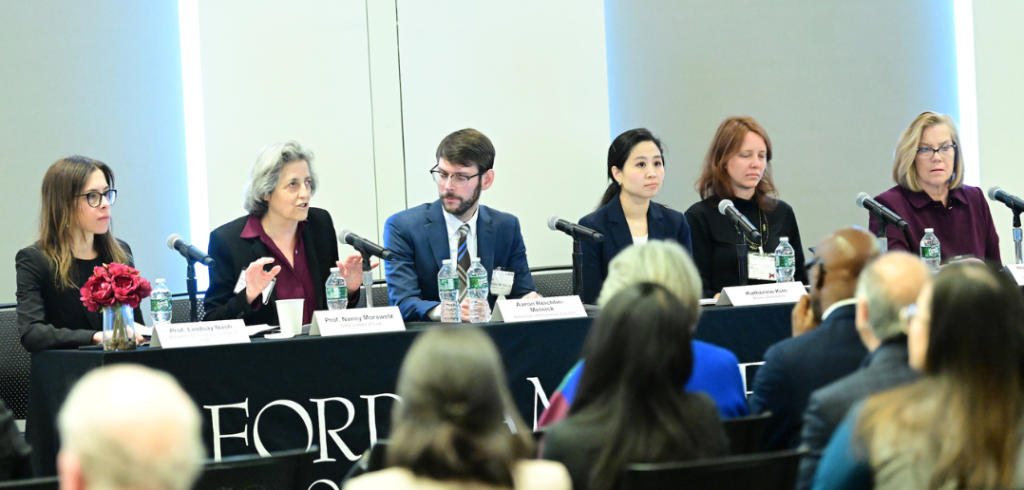This year’s Fordham Law Review Symposium was particularly special, in part because it celebrated the legacy of the Hon. Robert A. Katzmann, former chief judge of the U.S. Court of Appeals for the Second Circuit.
Judge Katzmann, a longtime friend of Fordham Law School who passed away in 2021, took an outsized role in reforming immigrant representation in New York. The symposium examined the impact of one of his many successful initiatives, the influential Katzmann Immigration Study Group, which marks its 15th anniversary this year.
Among other achievements, Judge Katzmann and the study group developed the idea that would become the Immigrant Justice Corps, which trains new lawyers in providing immigrant legal assistance. Judge Katzmann was also influential in creating the New York Immigrant Family Unity Program, which made New York City the first jurisdiction in the United States to provide universal representation to detained immigrants facing deportation.
Senior Judge Denny Chin ’78 of the U.S. Court of Appeals for the Second Circuit, co-director of the Center on Asian Americans and the Law at Fordham Law, was one of those invited to attend the study group’s early morning meetings. Its membership included other immigration judges, lawyers, academics, and clinicians, all of whom were “inspired by Judge Katzmann to join in one cause: addressing the unmet legal needs of the immigrant poor,” said Judge Chin.
“Despite our name … we did a lot more than study and talk about the problems,” said Judge Chin. “We developed concrete measures and took real action to address the issues. The progress has been amazing, and the study group and the projects it created are being replicated all over the country.”
Other events during the full-day program included a panel of other study group members, such as Jojo Annobil ’90, executive director of the Immigrant Justice Corps, and Judge Noel Brennan of the U.S. Immigration Court in New York.
Later, during a lunch presentation held in honor of Judge Katzmann, Dean Matthew Diller and Elizabeth Fine, counsel to New York Governor Kathy Hochul, shared their personal reminiscences of Judge Katzmann.
“I feel very lucky to have known not just Bob Katzmann, but the whole Katzmann family. And I consider them all my dear friends,” said Fine.
Dean Diller also used the occasion of the symposium to confer two honors on Judge Katzmann: an honorary degree, awarded in 2020 when he spoke at the Law School’s diploma ceremony, as well as the 2021 Fordham-Stein Prize. Due to restrictions caused by the COVID-19 pandemic, the Law School was unable to give the awards to the judge before his death. Both awards were accepted on Judge Katzmann’s behalf by his wife, Jennifer Callahan.
Dean Diller recounted some of Judge Katzmann’s accomplishments over his long career, including his time at the Brookings Institution, and as a law professor at Georgetown University, before eventually becoming a leader on the federal bench where he wrote “many beautifully-crafted watershed decisions” and was respected “not only as a jurist, but as an academic and renowned scholar of government.”
Throughout his extraordinary career, Judge Katzmann remained tethered to his core values, said Dean Diller. “However impressive these accomplishments are—and they’re staggeringly impressive—those of us who knew him, remember him … as deeply humble, with an incredible dry wit, an immense generosity of spirit, warmth, and a love of people.”
Since Judge Katzmann’s death, the study group—now called The Katzmann Study Group on Immigrant Representation—has continued his legacy through regular meetings and other events.
“This symposium is an important step in carrying on the work of the study group,” said Judge Chin, “not just to honor Judge Katzmann, but also because of the importance of the work, because of all the study group has accomplished, and because of all that it will continue to accomplish in the years to come.”



